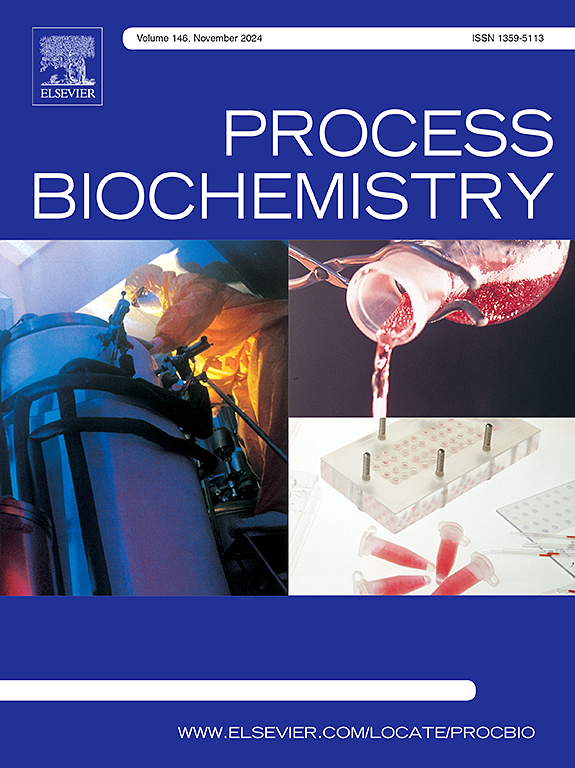秸秆或锯末复合微生物制剂对厨余垃圾好氧堆肥过程中有机物降解、酶活性和功能基因的影响
IF 3.7
3区 生物学
Q2 BIOCHEMISTRY & MOLECULAR BIOLOGY
引用次数: 0
摘要
增容剂和微生物剂被广泛用于改善好氧堆肥条件。本研究旨在评估由盐渍氮核杆菌、黑曲霉、地衣芽孢杆菌、蜡样芽孢杆菌和病毒毛霉组成的复合微生物菌剂与不同的膨松剂(秸秆或锯末)在厨余好氧堆肥过程中对有机物降解、酶活性以及与碳氮循环相关的功能基因的影响。结果表明,接种复合微生物菌剂能显著改善淀粉、蛋白质、纤维素和油脂的降解,同时提高微生物酶活性和碳降解基因的丰度。此外,在使用复合微生物菌剂的秸秆膨化堆肥处理(B)中,有机物(OM)、蛋白质、纤维素和油脂的降解量更高。同时,与其他处理相比,B 处理的 cdh 和 rbcL 基因丰度也更高。皮尔逊回归分析表明,温度是控制有机物降解的主要因素,而 cdh 和 cex 基因则与食物垃圾堆肥过程中的纤维素降解密切相关。这些研究结果表明,在厨余堆肥过程中加入秸秆作为膨松剂和复合微生物菌剂,可以有效促进有机物降解。本文章由计算机程序翻译,如有差异,请以英文原文为准。
Effects of composite microbial agent with straw or sawdust on organic matter degradation, enzyme activity and functional genes during aerobic composting of food waste
Bulking agent and microbial agent are widely used to improving the aerobic composting condition. This study aimed to evaluate the effects of composite microbial agent which is consisted of Azotobacter salinestris, Aspergillus oryzae, Bacillus licheniformis, Bacillus cereus and Trichoderma viride with different bulking agents (straw or sawdust) on organic matter degradation, enzyme activities, and functional genes associated with carbon and nitrogen cycling during aerobic composting of food waste. The results demonstrated that the inoculation of composite microbial agent significantly improved the degradation of starch, protein, cellulose, and grease, along with boosting microbial enzyme activity and the abundance of carbon degradation genes. Furthermore, the degradation of organic matter (OM), protein, cellulose, and grease were higher in the straw bulked composting with composite microbial agent treatment (B). Meanwhile, B also exhibited a higher abundance of cdh and rbcL genes compared to the other treatments. Pearson regression analysis identified temperature as the primary factor controlling organic matter degradation, while cdh and cex genes exhibited strong associations with cellulose degradation during food waste composting. These findings suggest that incorporating straw as bulking agent with composite microbial agent during food waste composting can effectively enhance organic matter degradation.
求助全文
通过发布文献求助,成功后即可免费获取论文全文。
去求助
来源期刊

Process Biochemistry
生物-工程:化工
CiteScore
8.30
自引率
4.50%
发文量
374
审稿时长
53 days
期刊介绍:
Process Biochemistry is an application-orientated research journal devoted to reporting advances with originality and novelty, in the science and technology of the processes involving bioactive molecules and living organisms. These processes concern the production of useful metabolites or materials, or the removal of toxic compounds using tools and methods of current biology and engineering. Its main areas of interest include novel bioprocesses and enabling technologies (such as nanobiotechnology, tissue engineering, directed evolution, metabolic engineering, systems biology, and synthetic biology) applicable in food (nutraceutical), healthcare (medical, pharmaceutical, cosmetic), energy (biofuels), environmental, and biorefinery industries and their underlying biological and engineering principles.
 求助内容:
求助内容: 应助结果提醒方式:
应助结果提醒方式:


